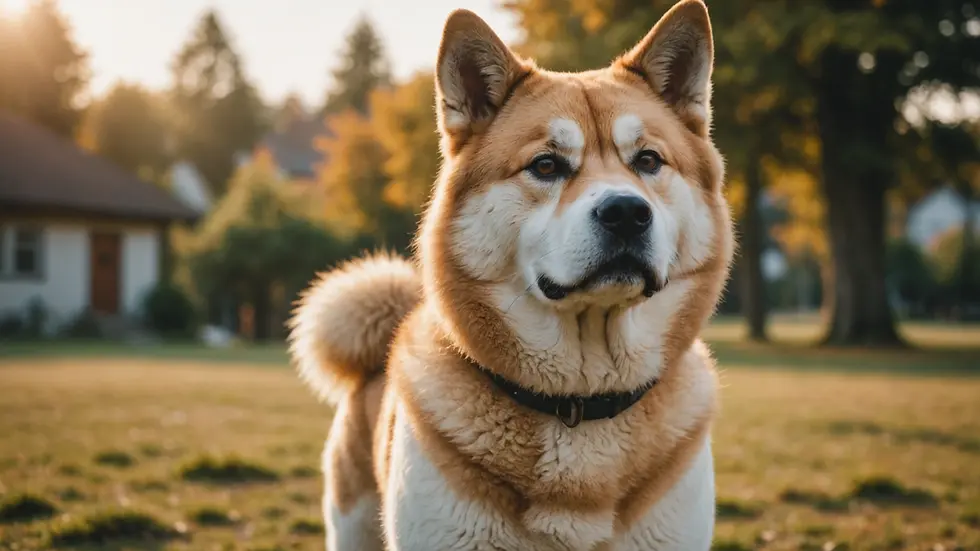Uncovering the Mysteries of Akita Dogs: A Closer Look at this Enigmatic Breed
- lisa pennington
- Feb 17
- 4 min read
Akita dogs captivate dog lovers with their loyalty, strength, and striking appearance. Originating from Japan, these remarkable canines have a rich history that infuses them with cultural significance. In this blog post, we will explore the essential aspects of Akita dogs, including their history, characteristics, care needs, and training requirements.
History of the Akita Dog
The Akita has a fascinating history that stretches back to the early 17th century in Japan. Originally bred for hunting large game such as bears, boars, and deer, these dogs played a critical role in Japan's history. They are named after the Akita Prefecture, where they were developed.
In addition to hunting, Akitas were also revered as family guardians. Their impressive strength and bravery earned them a prominent status in Japanese society. They have appeared in various forms of art and literature, often symbolizing loyalty and fidelity. For instance, the famous story of Hachiko, an Akita who waited for his deceased owner at a train station every day for nearly ten years, showcases the breed's unwavering devotion.
Today, Akitas are cherished as dignified and loving companions, with many families welcoming them into their homes worldwide.
Physical Characteristics
Akitas are known for their powerful build and beautiful looks. On average, they weigh between 70 to 130 pounds and stand between 24 to 28 inches tall at the shoulder. Their robust bodies are covered in a thick double coat that comes in various colors, including white, brindle, and shades from red to fawn.
Notable features include their erect, triangular ears and deep-set eyes, which give them a proud and dignified expression. Their curled tail over the back adds to their majestic look. In fact, a well-groomed Akita often turns heads, showcasing their strength and elegance.
Temperament and Personality
The Akita is known for its strong and complex personality. They exhibit fierce loyalty to their families, often forming close bonds with family members. However, their independence can sometimes pose training challenges, as they require consistent and firm guidance.
While they may seem aloof around strangers, Akitas can be loving and playful with those they trust. For example, a properly socialized Akita might enjoy playing fetch with children or experimenting with various dog sports. Early socialization is vital in helping them develop well-rounded behaviors and comfort around other pets and people.
Care and Grooming Needs
Owning an Akita involves a commitment to their physical and emotional well-being. Regular exercise is crucial, as Akitas are energetic dogs. Daily walks, playtime, and socialization opportunities are essential to keep them healthy and engaged.
Grooming is another important aspect of Akita care. This breed sheds heavily, particularly during seasonal changes. Weekly brushing helps manage their shedding and keeps their coat healthy. Although they do not require frequent baths, it's essential to avoid over-bathing to protect their skin's natural oils.
Training Requirements
Training an Akita can be both rewarding and challenging because of their strong personalities. Consistency is key, and early obedience classes are crucial for a well-behaved adult Akita. For instance, enrolling in a positive reinforcement class can significantly improve your Akita's responsiveness and behavior.
Utilizing treats, praise, and playtime as rewards encourages good behavior and reinforces commands. With patience and dedication, owners can successfully train their Akitas to follow commands and exhibit proper manners.
Health Considerations
Like all breeds, Akitas are prone to certain health issues. Some common concerns include hip dysplasia, autoimmune disorders, and various types of cancer. Regular veterinary check-ups play an essential role in spotting potential health problems early on.
Control of diet and regular exercise are also critical for their overall health. For example, a balanced diet that meets their nutritional needs and consistent outdoor activity can help keep them at a healthy weight. Additionally, Akitas are sensitive to extreme weather, so providing appropriate shelter in both hot and cold conditions is essential.
Myths and Misconceptions
Despite their popularity, many myths surround Akita dogs that can mislead potential owners. One common misconception is that Akitas are inherently aggressive. While they do have protective instincts, proper training and socialization can help them become well-mannered family companions.
Another myth is that Akitas are unsuitable for first-time dog owners. While they do require an experienced hand for training, with commitment and patience, even new owners can successfully raise an Akita. According to the American Kennel Club, dedicated training can ensure a well-adjusted and lovable existence for both the dog and the owner.
Final Thoughts on Akita Dogs
Exploring the world of Akita dogs reveals their remarkable traits and deep connection to history and culture. They are not only striking companions but also loyal members of the family. Understanding their unique needs, including grooming, training, and health requirements, is essential for anyone considering welcoming an Akita into their life.
Whether you are thinking about adopting an Akita or simply wish to learn more about this incredible breed, the journey into their world promises to be inspiring and rewarding. Embrace the distinct nature of the Akita, and discover the loyalty and companionship they bring to families.


Comments